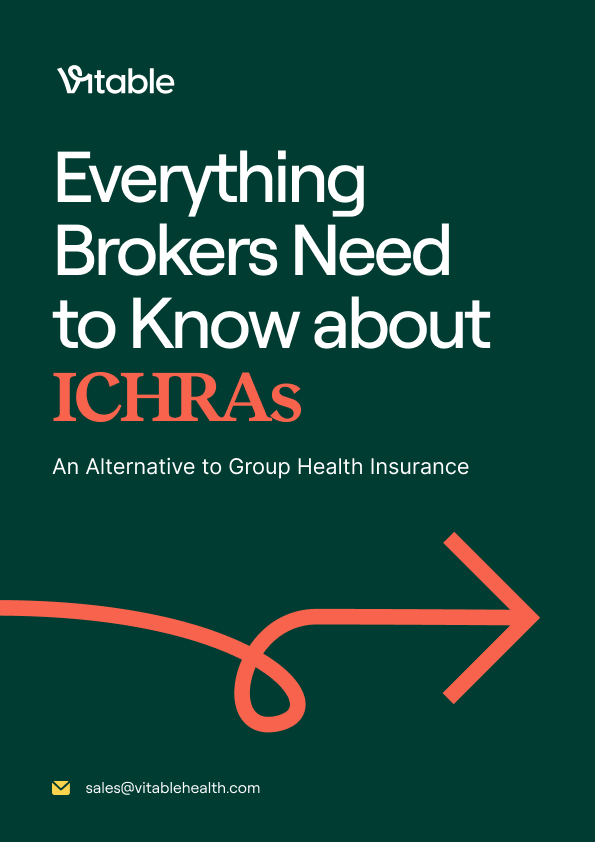Do You Have to Offer Healthcare Benefits to Part-time Workers?

Under federal law, companies are not required to offer healthcare benefits to part-time employees. But here's what often gets missed: part-time workers still impact your responsibilities under the Affordable Care Act (ACA), even if you’re not required to insure them. Part-time hours still count when calculating a company’s Applicable Large Employer (ALE) status, which determines whether you’re required to provide insurance to full-time workers. And if you miscalculate, the penalties can be steep.
In this article, we'll break down how to properly define and classify part-time employees, whether ACA compliance requires offering coverage to part-time workers, and provide affordable healthcare benefit options that help you support your team and retain top talent.
Key Takeaways:
- You’re not required to offer healthcare coverage to part-time employees—but their hours still matter
- Part-time hours count toward your ACA compliance and Applicable Large Employer (ALE) status
- Offering benefits to part-time employees can boost retention and help you attract stronger talent
What Qualifies as Part-time vs. Full-time Employees
Misclassifying your employees is one of the most common mistakes employers make that winds up costing them thousands in ACA penalties. The ACA has specific criteria that define full-time versus part-time status, and getting it wrong can lead to fines from the IRS.
Here’s what the ACA defines:
- Full-time employee: Anyone working 30 hours or more per week or 130 hours per month
- Part-time employee: Anyone working fewer than 30 hours per week or fewer than 130 hours per month on average
It's not just about job titles. If a part-time employee consistently works 30+ hours, they could be reclassified as full-time under the ACA. Be sure your HR and scheduling systems track this accurately.
Do Employers Have to Offer Health Insurance to Part-time Workers Under the ACA?
No, employers are not required to offer part-time workers insurance under the ACA. Here’s how it works, if you employ fewer than 50 full-time employees or full-time equivalents (FTEs), you’re not considered an Applicable Large Employer (ALE), and therefore, you’re not required to offer health insurance to any employees, full- or part-time.
If your company is an ALE, you are legally required to offer Minimum Essential Coverage (MEC) to 95% of your full-time employees only. The healthcare coverage must also be affordable and meet minimum value standards.
Here’s the bottom line:
- You’re not required to offer healthcare benefits to part-time workers.
- But you are required to include their hours when calculating your ALE status.
How Part-Time Employees Affect Your ALE Status & ACA Compliance
Even if your part-time employees don’t qualify for health insurance, they still matter when it comes to ACA compliance. Part-time employee hours count toward your total full-time equivalent (FTE) employees. An FTE, or full-time equivalent, is a way to account for part-time employees by converting their combined work hours into the equivalent number of full-time employees. This matters because when determining ALE status, the IRS doesn’t just look at how many full-time employees you have—they look at your total workforce, including the hours worked by part-time staff.
To calculate ALE status:
- Calculate the total monthly hours worked by all part-time employees (employees who work less than 30 hours/week).
- Divide that total by 120 to get your full-time equivalent (FTE) count.
- Now, count the number of full-time employees (employees who work 30+ hours/week).
- Add your total FTEs with your full-time employees. If the number is 50 or more, you’re an ALE.
Example:
You have 35 full-time employees and 30 part-time employees who each work 60 hours/month.
- 30 part-time employees × 60 hours = 1,800 hours per month
- 1,800 ÷ 120 = 15 FTEs
- 35 full-time + 15 FTEs = 50 employees → You are now an ALE.
If you're an ALE and fail to offer required coverage to your full-time team, you could face ACA penalties, even if those part-time employees don’t receive benefits.

Download 2025 Employer Guide to ICHRA
Vitable’s ICHRA Guide gives employers a clear, step-by-step resource for building smarter, ACA-compliant benefits.
This guide explains how ICHRAs work, who qualifies, and how Vitable simplifies setup, onboarding, reimbursements, and compliance — while giving employees more flexibility, control, and care.

Download Vitable’s 2025 Broker’s Guide to ICHRA
The Broker Guide to ICHRAs is a comprehensive resource that helps brokers understand, sell, and manage Individual Coverage HRAs with confidence.
This guide covers everything from compliance and class design to administration flows, case studies, and how Vitable streamlines quoting, enrollments, and reimbursements for brokers, employers, and employees.
Why Part-time Employees Count as FTEs But Aren’t Eligible for Health Insurance
If part-time employees count as full-time equivalents (FTEs), does that mean you have to offer them health insurance? It’s a fair question—but the answer is still no.
The ACA uses FTEs strictly as a calculation tool to determine whether your company qualifies as an Applicable Large Employer (ALE). But here’s the key: just because part-time workers count toward that ALE threshold doesn’t mean they themselves are entitled to health benefits.
FTEs are a mathematical representation of part-time labor. So while your part-time employees’ hours matter when calculating your total workforce size, they don’t change the rule about who qualifies for coverage. Only employees who consistently work 30 or more hours per week—or 130 or more hours in a month—are considered full-time under ACA guidelines and therefore must be offered health coverage.
Employers sometimes assume that crossing the ALE threshold means they now have to insure everyone on payroll, including part-time or seasonal staff. That’s not the case. As long as your part-time employees stay below the full-time threshold, you are not required to include them in your company’s healthcare benefit offerings, even if they helped push your business over the 50-employee mark.
The bottom line: part-time hours impact your compliance obligations, but they don’t create new benefit requirements for part-time workers themselves. That said, just because you’re not required to offer healthcare benefits to your part-time employees doesn’t mean you shouldn’t consider it.
In fact, for many employers, offering some level of coverage to part-time or hourly workers can be a strategic move, one that strengthens retention, supports recruiting, and sets your company apart in a competitive labor market.
Let’s take a look at how providing affordable health benefits for hourly or part-time workers can strengthen your business from the inside out (and it’s not that expensive!)
Why Employers Should Offer Health Benefits to Part-time Employees
You’re not required to offer health benefits to your part-time workers, but there are good reasons why you might want to. Part-time employees play a vital role in the success of your business, but are rarely offered employer-sponsored health insurance.
According to a 2024 report by the Bureau of Labor Statistics, only about 26% of part-time workers have access to healthcare benefits through their employer. Most companies reserve employee health benefits for full-time staff, and the primary reason is that traditional health plans are expensive. For businesses managing tight budgets, extending coverage to part-time workers may feel like a financial stretch.
But, in today’s job market, hourly and part-time employees expect more. Offering employee health benefits, even limited or non-traditional ones can be the difference between keeping a great worker and losing them to a competitor. Especially in high-turnover industries like home care, food service, or logistics.
It’s not just about employee satisfaction, it’s also about business performance. Providing even basic healthcare benefits to your part-time team can:
- Reduce turnover and lower hiring costs
- Improve employee well-being and reduce absenteeism
- Strengthen morale and workplace loyalty
- Attract a broader, more reliable pool of candidates
And here's the good news: you don’t need to offer expensive, traditional insurance to make an impact. There are affordable health benefits that are easy to roll out across your workforce, including part-time and hourly staff.
Affordable Health Benefits You Can Offer to All Employees
When most people hear “health benefits,” they think of major medical plans and major costs. But there are smarter, simpler ways to provide valuable healthcare that employees can actually use. These solutions are cost-effective, ACA-compliant, and scalable, whether your team is five people or five hundred.
Here are three benefit types that work well for businesses:
1. Health Reimbursement Arrangements (HRAs)
Health Reimbursement Arrangements (HRAs) like ICHRA (Individual Coverage HRA) and QSEHRA (Qualified Small Employer HRA) let you reimburse employees tax-free for health coverage and medical expenses, without managing a group plan.
- ICHRA is flexible and can be offered to any size company. You set a monthly reimbursement allowance, and employees purchase their own health insurance.
- QSEHRA is limited to companies with fewer than 50 employees and works similarly, by offering reimbursements for employees to purchase individual coverage.
HRAs give employees control and choice, while helping employers stay compliant and predictable with costs.
2. Direct Primary Care (DPC)
Direct Primary Care (DPC) is an insurance-free benefit model that gives employees direct access to primary care services for a flat monthly fee paid for by the employer—no copays or deductibles. With DPC, employees get unlimited access to everyday care like sick visits, wellness checkups, chronic condition management, and preventive care. Most plans also include same- or next-day virtual appointments, in-person visit options, and direct communication with a dedicated provider. No need to navigate a traditional insurance network.
For employers, DPC is an affordable way to offer meaningful healthcare benefits to both full-time and part-time staff and their dependents. Because it bypasses traditional insurance billing, DPC plans are cost-effective, easy to manage, and scalable. DPC works well as a standalone option for part-time or hourly workers, or it can be bundled with other offerings to create a more comprehensive benefit package.
3. MEC + DPC Bundles
A Minimum Essential Coverage (MEC) + Direct Primary Care (DPC) bundle is a simple, affordable way to offer meaningful healthcare benefits to all employees—part-time and full-time alike. MEC plans cover essential preventive services required under the ACA, including annual wellness visits, immunizations, screenings, contraceptive care, and pediatric services.
Direct Primary Care fills the gap by providing unlimited, $0 access to everyday care like sick visits, chronic condition support, same- or next-day virtual appointments, and mental health services. Together, MEC and DPC create a complete, practical benefits package that’s easy to implement, scalable for teams of any size, and built around how people actually use healthcare. It’s a smart way to care for your team—and a smart compliance move, too, as MEC satisfies ACA Part A requirements and helps prepare your company as it grows toward ALE status.
Learn more about how DPC and MEC works together in this article!
Vitable Health: A Better Way to Offer Health Benefits
Vitable Health is a leading health benefits platform built for today’s workforce. We make it easy and affordable for employers to offer real, high-quality care to their teams—whether they’re full-time, part-time, hourly, or somewhere in between. We believe primary care is the foundation of everyday health, that’s why every Vitable plan comes backed by comprehensive, built-in Primary Care. Our primary-care-first model empowers businesses to provide a better standard of care that employees actually use, while keeping costs low and predictable.
We offer a full suite of health benefits, including:
- Minimum Essential Coverage (MEC)
- MEC Plus and Major Medical options, like our MVP coverage
- Individual Coverage HRA (ICHRA) and Qualified Small Employer HRA (QSEHRA)
- Ancillary benefits like vision and dental
- Premium add-ons: GLP-1 Program and Premium Labs
Here’s how Vitable is different:
- Primary Care is built-in. It’s at the core of every plan, covering real, everyday needs from day one.
- Transparent, no-nonsense pricing. No hidden fees. Just smart, affordable healthcare.
- A simple app experience. Making primary care accessible—wherever your team is.
- Designed for real life. Benefits that fit hourly schedules, part-time needs, and modern workplaces.
- Compliance that feels like care. Staying ACA-compliant shouldn’t mean settling for less. With Vitable, it doesn’t.
Vitable is setting a new standard for healthcare; one designed for real people, real needs, and real use. Whether your employees are full-time, part-time, or somewhere in between, we make it easy to give them access to benefits that matter.
Ready to learn more?
Stay ahead with the latest insights on healthcare, benefits, and compliance—straight to your inbox.
Get a quote
Get a personalized health benefits quote tailored to your company’s unique needs.
Vitable helps employers provide better healthcare to their employees and dependents by improving accessibility, cost, and quality.
